Stop Tolerating Poor Employees – The Team Impact of Bad Employees
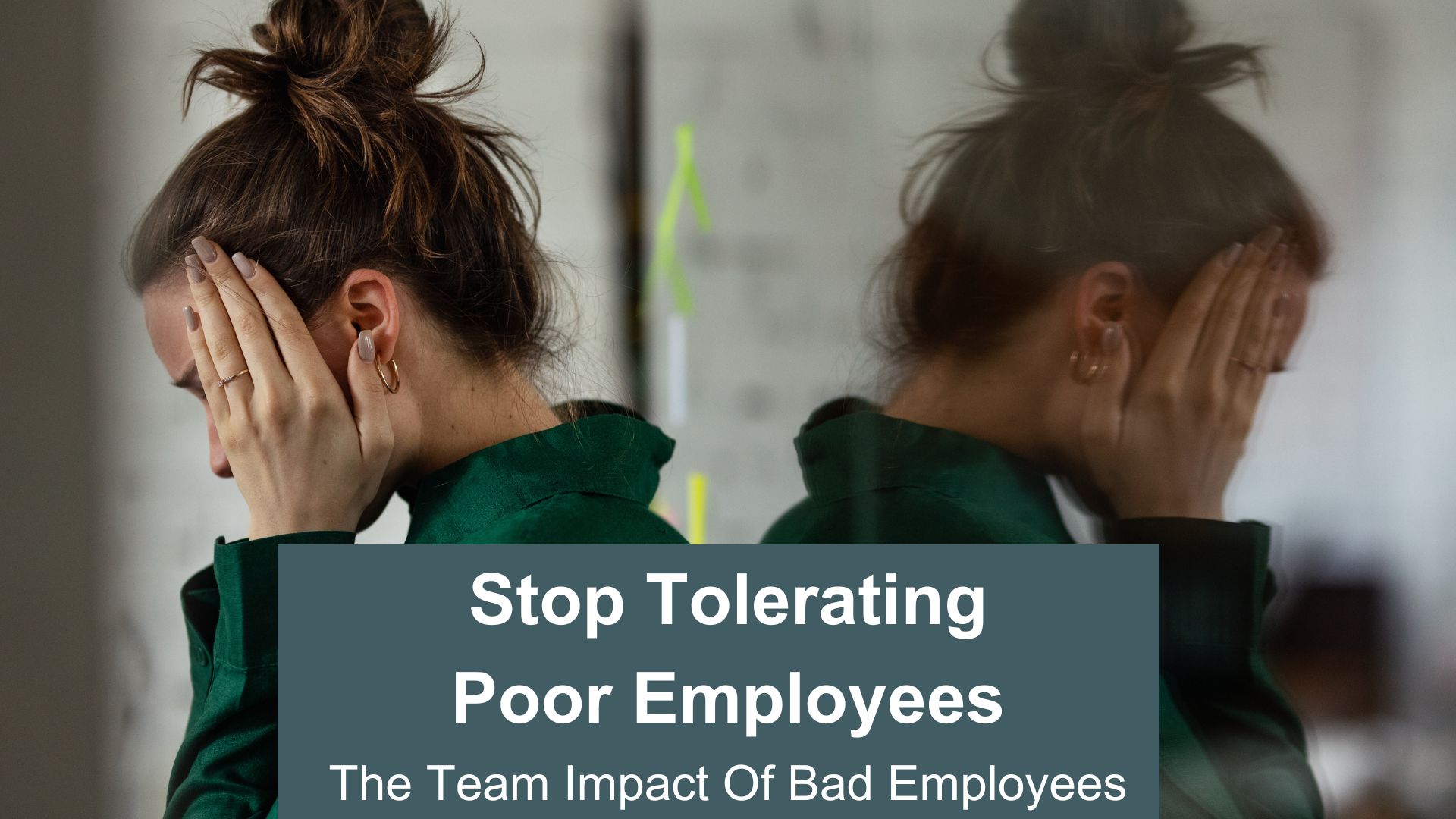
Stop tolerating poor employees. No matter how nervous you feel about taking action with bad employees or how difficult taking action might be, the consequences of not taking effective action are a lot worse for you personally, the team and the business.
The team impact of bad employees is huge in my view. I have step-changed the performance of multiple underperforming teams in my career. As a result I have personally seen the impact of tolerating bad employees on those teams and worse, their managers.
To encourage you to stop tolerating poor employees and to highlight the team impact of bad employees I am covering 6 impacts of tolerating poor employees.
A better understanding of the impact of bad employees will mean you take better action sooner which gives you and your management career a lot of benefits:
- Stronger reputation
- A lot more trust in your ability to manage others well
- Faster career progress
- A lot less stress and frustration
- A higher performing team
Stop Tolerating Poor Employees – The Team Impact of Bad Employees
- Manager’s purpose is team performance
- Poor employees are anchors
- The corruption effect of poor employees
- How inaction destroys trust
- The Creation of Vicious Spirals
- How Bad employees sideline careers
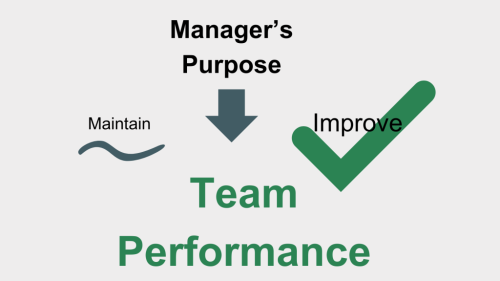
Very few managers are taught how to take effective action by their companies. Way too many managers are left to figure out what to do by themselves which creates another big barrier to the manager taking sensible effective action quickly. Take a look in the description below for videos and resources to learn more about what to do.
The impact of poor employees grows over time. Take action as early as possible and certainly before the team impact of bad employees becomes noticeable outside of your team.
Watch on YouTube
Listen on Podcast
Before we dive into the impacts on teams of bad employees, I want to highlight to you the central role managers have to play in tackling poor employees and why it can define or sideline your management career.
Manager’s purpose is team performance
In my view, a manager’s jobs exists to – as a minimum – maintain team performance but really to improve team performance. Companies need improved performance to succeed ahead of their competitors.
Studies used by McKinsey’s demonstrate that managers in the top 5% create around 8 times more value for the business than average managers. 8 times is a huge difference. At least 80% managers have scope to significantly step-change their team’s performance.
It is people that make decisions every day in a company. It is people that turn ideas into reality. It is people that keep all the activities and projects going in a company to create the output of that company. Employees make or break companies. Companies need managers to get the very best from the teams they manage. Companies assess a manager’s performance primarily on the performance of the team they manage.
Anything that reduces the performance of a team is a bad thing for the manager and for the company.
Having bad employees – the cost of ignoring the problem quickly becomes bigger than you think and worse – the negative impact keeps growing.
It is 110% in the manager’s best interests to stop tolerating bad employees and take effective action quickly. I have seen many managers’ career stall when they tolerated poor employees or even lost their jobs because of it.
The impact of bad employees on managers careers are big and even bigger on the team and the business. [For a reliable proven approach to transform problem people impacting team performance, take a look at our course on How to Manage Difficult Employees]
Let’s get into the impact of bad team members and why these impacts hit team performance hard.
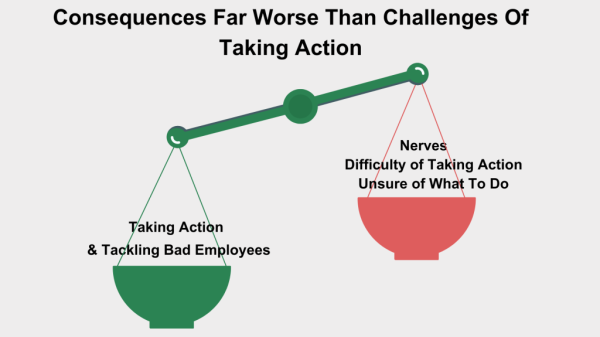
The first team impact of poor employees is they are performance anchors
A bad employee typically doesn’t produce as much as a average team member. Poor employees often cause knock-on problems for other team members in terms of missed deadlines and reworking low quality output. This is just the start of the team impact of bad employees.
Imagine when you join a team, you look around to see how each of your colleagues is performing. You work to make sure you are not at the bottom, and some of you will work harder to try to be at the top. Most are happy being in the middle. A poor employee lowers the bottom of the range of acceptable performance. The middle is a bigger place, and a slightly lower performance is now perfectly okay for most. The team impact of poor employees is a much bigger drop in team performance than their personal work creates.
Imagine being the manager of the team. You are trying to set higher expectations by setting goals, talking about what is acceptable etc. The team look at the bad employee and know they are not meeting the standards being set out yet there is no obvious consequence. How can the manager raise expectations when a glaring example of lower expectations is present every day. Bad employees anchor or stop management efforts to raise expectations because lack of actions speak louder than words.
Next imagine what the team manager’s boss, peers and colleagues around the business might start thinking if the manager’s team performance drops compared to teams around the business?
The impact of bad employees is bigger than you think. Stop tolerating poor employees.
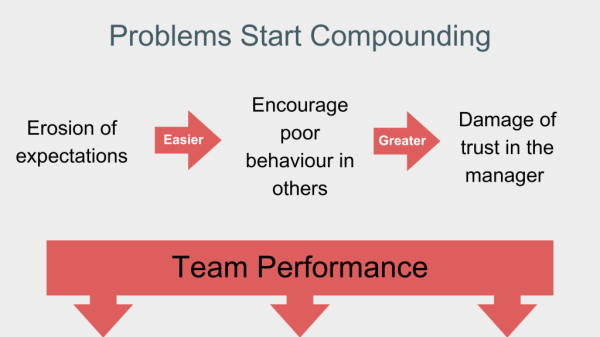
The second team impact – The corruption effect of poor employees
It is amazing how one bad employee can corrupt a whole team. The speed at which corruption can happen is also scary, particularly when the poor employee is socially influential.
The Harvard Business Review undertook research to understand the impact of bad behaviour on colleagues. Their conclusions were misconduct by an employee increases the chances of misconduct in colleagues by 59%. That is a pretty huge increase.
Poorly behaving or underperforming employees often actively encourage their colleagues to act poorly or underperform. If lowering other team members performance reduces the risk to your job, negatively impacting others can be very tempting. This peer effect can quickly become poisonous to team culture and motivation. In turn, if no actions are taken by the manager, team performance is pretty much guaranteed to drop.
As more and more of the team’s behaviour or performance drops, the social pressure on those performing to drop their performance increases. The corruption effect increases with time in my experience.
As a manager, take action quickly to set very clear expectations and then enforce these expectations through using performance improvement plans and disciplinary action.
Take steps to stop tolerating poor employees quickly and reduce the risk of dropping team performance.
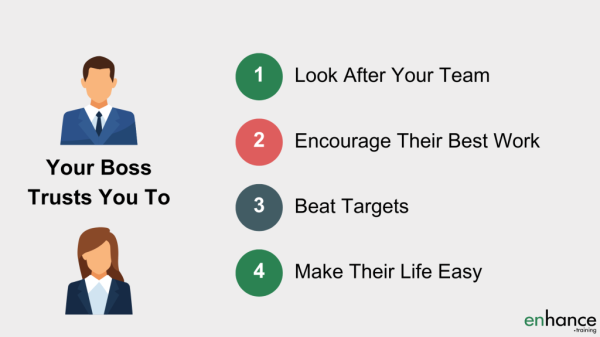
The third team impact of bad employee – How inaction destroys trust
Trust is a requirement for teamwork. The more trust a team builds, the better the team will perform. A team outperforms a collection of individuals hands down.
Think about all the people that trust you to do your job as a manager well.
Your team members trust you to look after them personally, to look after their careers, to develop them and to create a positive atmosphere to work in. All team members are personally better off when they have a manager that creates opportunities and improves team performance.
Your boss trusts you to look after your team, to encourage the team member’s best work, to meet and beat team targets and to reduce the pressures and the issues your boss is faced with.
All other colleagues and managers in the business trust you to ensure your team pulls their weight and positively contributes to the success of the company. This improves job security, increases career opportunities, bonuses etc – everything that comes with working in a successful company.
Guess what happens when you tolerate poor employees in your team. When the team impact of bad employees becomes noticeable. When your team misses their targets. When your team is no longer pulling their weight for the company.
Trust in your personally drops
Yes, trust in you personally drops as everything colleagues look to you to protect gets worse. Trust in your ability as a manager drops. As trust in you drops, team work drops and this compounds the negative impact of the poor employees further.
As soon as your team’s performance starts dropping, trust in you starts dropping.
Managers – stop tolerating poor employees. Take action or lose the trust of those around you. Your reputation and job is on the line. The impact of bad employees is serious for everyone.
The fourth team impact – the Creation of Vicious Spirals
Many of you I am sure have worked out that the many impacts of poor employees have a compounding effect. Once the problems start, they usually only get worse, as each problem makes neighboring problems worse.
For example, the erosion of expectations makes it easier for problematic employees to actively encourage poor behaviour in others, which in turn damages trust in the manager and on it goes.
The environment in which everyone works gets worse. Team enjoyment and motivation drops. Trust and teamwork drop. Then team performance starts to go down. Other teams look like nicer places to work with better development opportunities.
The Best Leave First
The best employees are the first to leave because getting another job elsewhere is easier for them. The problems suddenly become worse. A vicious spiral quickly builds, if left unchecked. A change of manager is a common way to break this spiral.
Taking action as early as possible makes sorting out the problems quicker and easier. The longer you leave taking action as a manager, the harder it becomes to take action. I, like many managers, learnt the hard way not to tolerate poor employees.
The actions you take will also be judged by all around you. Keeping the trust of your team, your manager and other stakeholders through the actions you take – are even more important than taking action.
Focus on creating clear expectations and constantly reinforcing those expectations. As soon as you see any evidence of poor performance or bad behaviour, prepare well so you can drive change with that person, and finally use a set of escalating actions with the problem employee so your actions are seen as fair and give the problem person a chance to change without letting them off the hook.
How Bad employees sideline careers
I personally have met quite a few managers that lost their jobs because they tolerated bad employees too long. I have sat in plenty of meetings with leadership teams discussing which managers should get promoted and why.
If you are not able to effectively and fairly manage problem team members so that you remove the problem – but not necessarily the person – and do so in a way that keeps the trust of your team and boss, then your management career is likely to be sidelined. i.e. you won’t be given more people to manage or get promoted.
Businesses face intense competition at all times. 95%+ of businesses simply can’t afford to employ managers that don’t at least maintain team performance. Those managers that can consistently improve team performance are highly sort after and promoted quickly.
Practice and get confident in spotting and then taking effective action with problem employees
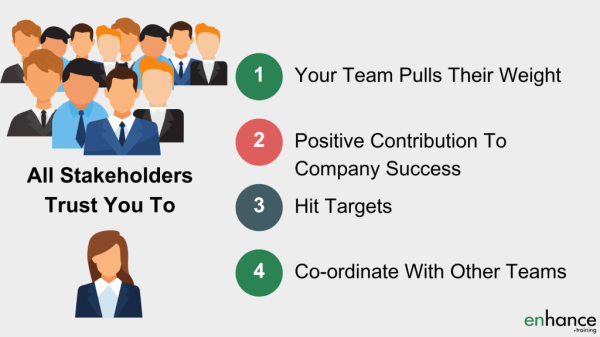
In Summary
Poor employees, underperformers, those with poor behaviour or those that don’t add much value to the team or business can easily cause a lot of problems for their manager is not handled in the right way. If you currently have bad employees, please stop tolerating poor employees. The team impact of bad employees is too big to ignore, and it will keep growing.
To highlight the team impact of poor employees, we have covered:
- Manager’s purpose is team performance
- Poor employees are anchors
- The corruption effect of poor employees
- How inaction destroys trust
- The Creation of Vicious Spirals
- How Bad employees sideline careers
If you are unsure of how to tackle poor employees, would like to know you are taking the best approach or are encountering resistance – from the employee, HR or your manager – then please take a look at our course on How to Manage Difficult Employees – Reliably transform problem people impacting team performance.

I learnt the hard way early in my career to not tolerate poor employees. To some this approach may sound harsh. My response is that providing you are, as a manager, offering a fair exchange for doing a good job – for instance by working hard to develop staff – then if team members are not meeting expectations, you must take action to change that. If you don’t, you let too many people down including yourself.
Be fair, be considerate, be empathetic AND stop tolerating poor employees!




